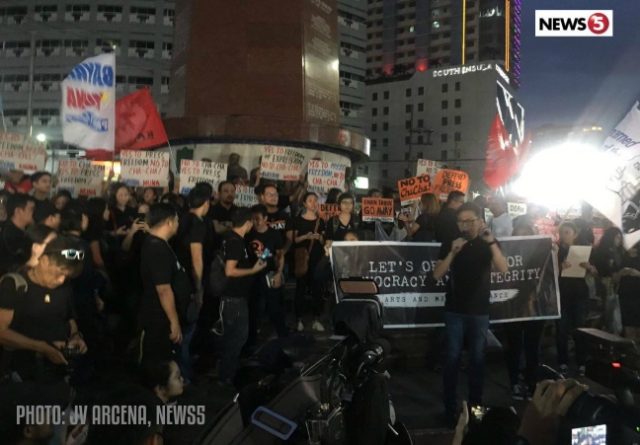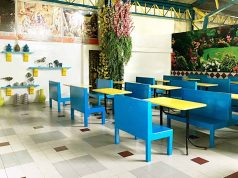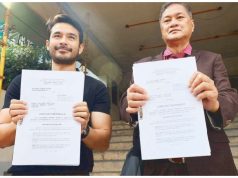
International diplomats have condemned the attacks against press freedom in the Philippines and expressed their support for veteran journalist Maria Ressa, chief of Rappler, following her arrest over cyber libel charges on February 13.
Chrystia Freeland
Freeland, Canada’s Minister of Foreign Affairs, joined in the hashtag campaign #StandWithMariaRessa as she expressed how “deeply troubled” she was with Ressa’s arrest.
“A free press is a bedrock of democracy. Canada reiterates its call for due process to be respected and for journalists to be free from harassment and intimidation,” Freeland said.
Deeply troubled by reports that @mariaressa has been arrested in the #Philippines. A free press is a bedrock of democracy. Canada reiterates its call for due process to be respected and for journalists to be free from harassment and intimidation. #StandWithMariaRessa
— Chrystia Freeland (@cafreeland) February 14, 2019
Last December 2018, she also shared her concern over Ressa’s safety after the latter was almost detained that time on tax evasion charges.
Canada remains deeply concerned for the security and safety of @mariaressa in the #Philippines. The harassment and intimidation of journalists have no place in democracy. We call for due process to be respected and stand with all journalists working in defence of the truth.
— Chrystia Freeland (@cafreeland) December 4, 2018
Reporters without Borders rate Canada in the 18th spot of its World Press Freedom Index.
Madeleine Albright
Albright, the first female Secretary of State of the US, described the incident as “outrageous” and “must be condemned by all democratic nations.”
“I’m proud to call her a friend and to stand with her in defending the principles of a free press,” the politician-turned-novelist said.
The arrest of journalist @mariaressa by the Philippine government is outrageous and must be condemned by all democratic nations. I’m proud to call her a friend and to stand with her in defending the principles of a free press. https://t.co/Hy09UFsARl
— Madeleine Albright (@madeleine) February 13, 2019
Similar to Freeland, Albright also denounced the government’s indictment of Ressa’s tax evasion charges last December.
In 2017, the chair of the National Democratic Institute awarded Rappler, along with StopFake.org in Ukraine and the Oxford Internet Institute’s Project on Computational Propaganda, for their efforts on fighting fake news online.
National Democratic Institute
The NDI denounced the case against Rappler as President Rodrigo Duterte’s “move to silence Philippine media.”
NDI condemns the arrest of @mariaressa, chief executive officer of @rapplerdotcom, and the continued efforts by the Philippine government to quell press freedom. https://t.co/7foHhoT8YO pic.twitter.com/jM1InndSll
— National Democratic Institute (@NDI) February 13, 2019
“A free press is an essential ingredient in any democracy, and journalists are often the ‘canaries in the coal mine’ when authoritarians seek to consolidate power against the will of the people,” said NDI President Derek Mitchell.
“The Duterte government’s latest move to silence the Philippine media should be seen by the international community for what it is: a warning sign that should not go ignored,” Mitchell added.
David Kaye
Kaye, United Nations Special Rapporteur on Freedom of Opinion and Expression, said that Ressa being taken into custody is a “very serious escalation” of media harassment.
let’s be clear: this very serious escalation is harassment of media inconsistent w #Philippines obligations to promote & protect freedom of expression—>Rappler CEO @mariaressa arrested for cyber libel https://t.co/TnzPeGcFzo via @rapplerdotcom
— David Kaye (@davidakaye) February 13, 2019
“Maria Ressa is one of the great global journalists/entrepreneurs and an advocate for and friend to free press everywhere,” he said on Twitter.
What happened?
Armed with a warrant of arrest, officers in civilian uniforms of the National Bureau of Investigation went to the office of Rappler and arrested Ressa for supposed violations of Republic Act 10175 or “the Cybercrime Prevention Act of 2012” over a story that was published months before this measure was enacted.
The story, titled “CJ using SUVs of ‘controversial businessmen,’” implicated businessman Wilfredo Keng to illegal drugs and human trafficking.
Some of Rappler’s reporters also alleged that they were intimidated by some of the officers when they were recording the incident via their phones.
Press groups here and abroad denounced such move as the government’s persecution or “bullying” of journalists critical to their policies and opinions.








